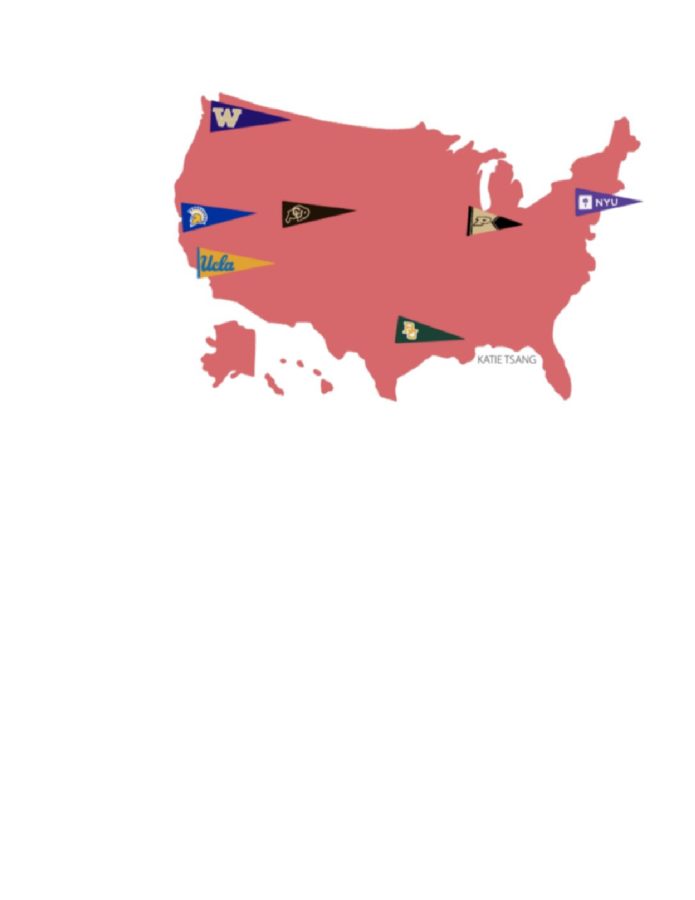Editorial: In defense of the post-grad map
Behind our decision to publish the post-graduation map
May 20, 2022
Each year, The Oracle publishes a graduation map with a list of seniors’ schools and future plans categorized by location in its final issue. The map is supposed to represent the diversity of the school’s community and students’ individual accomplishments, yet has been criticized for contributing to a toxic, college-focused campus culture.
Most local high school publications also publish versions of the graduation map, but in recent years Palo Alto, Cupertino, and Gunn high schools have eliminated their graduation maps, citing their perpetuation of toxic competition as the reason for this decision.
After careful consideration of the three primary criticisms levied against the map, and with the goal of informing readers and making ethical decisions that will best serve the student body in mind, The Oracle editorial board has decided to keep the graduation map in this issue.
The first criticism is that the graduation map forces unhealthy comparison between students about their plans without acknowledging external factors playing a role in students’ decisions.
However, the map solely provides factual information; students, staff members, and parents’ tendency to interpret the map without taking into account external factors that lead to students’ decisions is not the fault of the grad map itself. Eliminating the map would not eliminate unhealthy comparison; only a region-wide cultural shift in how students, faculty, and parents view college could accomplish this.
To guide the map’s interpretation and help encourage this cultural shift, The Oracle is including a statement alongside the map. The statement urges readers to consider the variety of financial circumstances, personal and career aspirations, and familial situations that factor into students’ post-graduation decisions.
Even if there isn’t a published map, students will share their post-grad plans on social media. Allowing all students to share their plans through the graduation map, however, ensures that the student body is made aware of a diverse array of plans, rather than limiting them to the plans of the people they follow who choose to share.
A second criticism of the map is that it makes students uncomfortable, especially if they’re not proud of their future plans.
When comparing their plans to those of the rest of their friend group, students taking less traditional paths or going to less “prestigious” schools can feel less proud of their future. But by allowing those students to see a diversity of paths, including paths similar to their own, the graduation map creates a sense of community and self-assurance.
This year, participation in the map is entirely optional. Previously, The Oracle has repeatedly followed up with students who didn’t fill out the form to be included, but to decrease pressure for students who do not wish to be listed, The Oracle has put an emphasis on self-selection. The Oracle assumed that not responding to the survey meant that a student did not want to be listed so did not send follow-up emails to those who did not respond.
A third criticism is that the map contributes to a toxic academic culture by valuing individuality over community. The Oracle considered only listing schools, without students’ names, but ultimately decided not to because it puts more emphasis on the prestige of the school than on the student’s personal achievements, which the graduation map strives to celebrate. The map provides a physical reminder of the hard work, perseverance, and dedication that has fueled their success throughout high school and that they will carry with them.
In a survey sent to the senior population, with 97 responses, around 90% responded that the graduation map had a neutral, positive, or very positive effect on the school, demonstrating that students generally do not find the map dangerous in promoting a negative culture.
Removing the map would be a performative display of activism on behalf of student mental health, and would fail to address the root causes of this issue.
The Oracle urges readers to be mindful of their interpretations of the graduation map and congratulates all seniors entering a new and exciting phase in their lives.
This decision represents our current viewpoint but we are always open to new information that may change what we do in future issues. The Oracle hopes to continue having discussions on this important topic. Please email carla.gomez@mvla.net with any suggestions, ideas, or opinions.
































